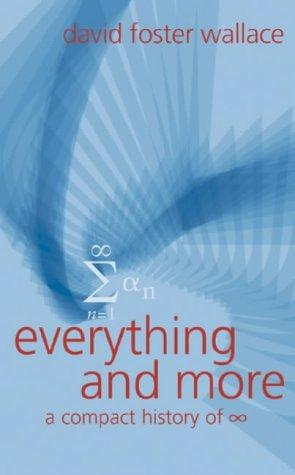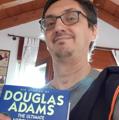Karsten W. reviewed Everything and More by David Foster Wallace
Review of 'Everything and More' on 'Goodreads'
5 stars
I came across David Foster Wallace through his famous speech "This is Water". I then read some of his essays, about lobsters, about cruises, about severe depression and about how few good books there are on mathematics that can be understood by lay people.
The last essay in particular, "Rhetoric And The Math Melodrama", made me curious about how Wallace himself would write such a book on mathematics. And indeed, Everything and More is a unique non-fiction book.
I like the personal references: Wallace's niece is mentioned, the high school teacher gets a place of honour. I like how Wallace sketches the human side of the mathematicians (Kronecker, Cantor, Weierstrass, Dedekind et al) with one paragraph, I had an immediate image, and contrary to some biographies, I think these images are plausible.
I also like how he takes elements of textbooks on mathematics and plays with them. Abbreviations suddenly appear …
I came across David Foster Wallace through his famous speech "This is Water". I then read some of his essays, about lobsters, about cruises, about severe depression and about how few good books there are on mathematics that can be understood by lay people.
The last essay in particular, "Rhetoric And The Math Melodrama", made me curious about how Wallace himself would write such a book on mathematics. And indeed, Everything and More is a unique non-fiction book.
I like the personal references: Wallace's niece is mentioned, the high school teacher gets a place of honour. I like how Wallace sketches the human side of the mathematicians (Kronecker, Cantor, Weierstrass, Dedekind et al) with one paragraph, I had an immediate image, and contrary to some biographies, I think these images are plausible.
I also like how he takes elements of textbooks on mathematics and plays with them. Abbreviations suddenly appear that have to be remembered, proofs, "interpolations". It may give a layman a sense of how mathematics is often written then and now.
The many footnotes and "IYI" ("if you're interested") insertions make the revision processes visible to me. Sometimes there is direct reference to notes from the editor, sometimes a footnote nullifies itself, "but in an interesting way". This brings Wallace closer to me, I am not only concerned with the text and its content, but also with Wallace, with the thoughts that (might) have led to the text.
From a mathematical-philosophical point of view, I find §1c particularly interesting, where two types of abstraction are presented: one where the concrete is inferred to the abstract ("horse", "forehead", "horn") and one where different abstractions are linked together ("unicorn"). I also find interesting, even if I don't yet know exactly what I will do with it, the criticism of the "Theory of Types" in §7f, according to which it is be a philosophically bad idea to derive definitions from paradoxes.
Mathematical induction, the epsilon delta technique and the diagonal proof are presented as techniques for dealing with the infinite. From my point of view, the compactification is missing, although the idea was touched upon. I would also have liked more on the axiom of choice. But I can understand that in a book where Cantor is the focus, it is only mentioned. (For those interested in mathematics: Eric Schechter in Handbook of Analysis and its Foundations really goes into this topic intensively from a practical point of view).
In short: a beautiful book that invites you to pay attention not only to the content but also to the form.


